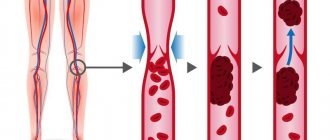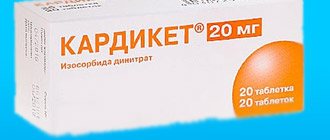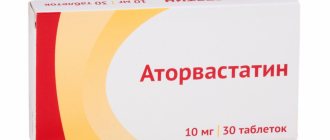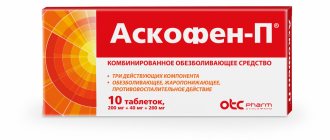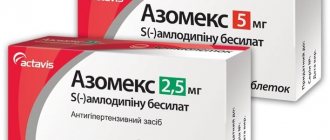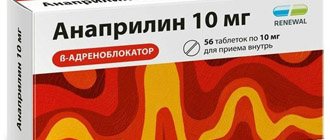Daily therapy with acetylsalicylic acid can be a lifeline and reduce the risk of heart attack. But taking an aspirin tablet daily is not a therapy for everyone. Let's try to figure out whether you need it?
If you've had a heart attack or stroke, your doctor has probably recommended that you take aspirin daily. If you are at high risk of having a heart attack, your doctor may recommend aspirin after weighing the risks and benefits. Although taking 1 or 2 aspirin tablets for headaches, chills, or joint pain is safe for most adults, taking aspirin daily on your own can have serious side effects, including internal bleeding.
How can aspirin prevent a heart attack?
Aspirin prevents blood clotting. When bleeding, special blood cells - platelets - seal the hole in the blood vessel and stop the bleeding.
Similar processes involving platelets can also occur in the vessels that supply the heart with blood. If the coronary vessels are affected by atherosclerosis, a blood clot may form in the area where atherosclerotic plaques form. If a clot blocks an artery, blood will stop flowing to the heart. This will cause a heart attack. Aspirin reduces the ability of platelets to stick together and form a blood clot. And therefore can prevent a heart attack.
Your doctor may suggest daily therapy with acetylsalicylic acid if:
- Have you already had a heart attack or stroke?
- You have not had a heart attack, but you have had coronary artery bypass surgery, or have chest pain due to coronary artery disease (angina), or have a stent placed in a coronary artery
- You are at high risk of having a heart attack if you have at least 2 of the following 4 symptoms: diabetes, age over 50, high blood pressure, and a smoker.
Prophylactic aspirin is indicated for people aged 50 to 59 years if there is no risk of bleeding and if the person has a greater than 10% risk of heart attack or stroke within the next 10 years. For adults younger than 50 years and older than 60 years, more research is needed to determine the benefits and risks of daily aspirin therapy.
Today, there is ongoing debate about the benefits of aspirin for people who have not had a history of a heart attack. But most experts agree that the higher your risk of developing a heart attack, the greater the chance that the benefits of taking a daily aspirin tablet will outweigh the harm of developing complications from aspirin therapy.
It is known that the doses of acetylsalicylic acid (ASA) recommended for the primary prevention of cardiovascular diseases (CVD) vary in different countries. However, in any region there is a tendency to prescribe the same dose for all patients. Thus, in European countries, the prophylactic dose of ASA is most often 75 or 100 mg per day, and in the USA - 162.5 or 325 mg per day. Despite the increasing emphasis on personalized medicine and the consideration of complex genomic and molecular factors in treatment selection, simple parameters such as patient height, weight, age and gender are often not taken into account. Meanwhile, on July 12, the Lancet published a meta-analysis of ten randomized controlled trials, including a total of one hundred and twenty thousand patients. The average weight of patients in various studies ranged from 60 to 81 kg. It has been shown that in the general population, taking 75-100 mg ASA per day. led to a reduction in the risk of death from CVD, myocardial infarction or stroke by 12% (p = 0.0008), and in individuals weighing 70 kg at a dose of 75-100 mg per day. did not decrease (p = 0.24), but at a dose of 325 mg per day. the risk was reduced by 17% (HR 0.83, 95% CI 0.70-0.98, p = 0.028). Unfortunately, the subjects' risk of bleeding also increased with decreasing weight. Moreover, if the patient weighed 70-90 kg, then he did not receive significant benefit from ASA, and the risk of bleeding significantly increased. All results applied to both male and female participants.
Take 75-100 mg ASA per day. was also associated with an unchanged reduced risk of colorectal cancer in patients weighing 80 kg (RR 1.08, 95% CI 0.83–1.39).
Patients weighing >70 kg require higher doses of ASA, which should generally result in an increased risk of bleeding. Meanwhile, in the meta-analysis described, about half of the women and 80% of the men weighed >70 kg, which means they needed a different dosage regimen. At the same time, the practice of prescribing 325 mg of ASA per day, common in the United States, is questionable, given the increased risk of bleeding and the proven effectiveness of lower doses. This requires a balanced risk assessment for each patient group. The study authors believe that the risk of bleeding does not vary linearly with dose, so the effectiveness and risk of different dosing regimens for each weight should be studied in future randomized clinical trials.
Overall, a number of commentators considered the study's findings to be reasonable and consistent with current understanding of the effects of ASA. The same dose of a drug should not have the same effect in patients of different height, weight, age and baseline cardiovascular risk, but no previous clinical trials included enough patients to clarify this issue. It was noted that the effect of the drug did not differ between men and women, but there was a strong correlation of gender with weight, which may lead to less effective CVD prevention in men than in women in previous studies.
The meta-analysis also points to a number of upcoming large randomized trials aimed at elucidating the role of ASA in the primary prevention of CVD. The ARRIVE trial will compare 100 mg aspirin with placebo in 12,000 people at moderate risk of CVD. The ASPREE study will study the same dose in 19,000 older patients (65 years and older). In the ASCEND study, 100 mg aspirin per day. will be compared with placebo in 15,000 diabetic patients without CVD. The use of ASA in secondary CVD prevention is already being studied in the ADAPTABLE trial. It compared 81 mg and 325 mg aspirin in secondary CVD prevention in 15,000 patients. If the research data are consistent with each other, the described results will be considered reliable.
Prepared based on materials:
https://www.thelancet.com/journals/lancet/article/PIIS0140-6736(18)31133-4/fulltext
Aspirin dose
Depending on your indication, your doctor will help you find the right dose of acetylsalicylic acid for you.
As a rule, no more than 85 mg of acetylsalicylic acid per day is prescribed for daily preventive use, but in some cases individual dosage is possible. For people who have had a heart attack or have a stent in a coronary artery, it is very important to take aspirin and other blood thinning medications exactly as your doctor recommends. For them, stopping daily therapy with acetylsalicylic acid can have life-threatening consequences: provoke the development of a blood clot and lead to a heart attack. For such people, taking any medications that reduce the effectiveness of acetylsalicylic acid must be agreed with their doctor.
When taking aspirin daily, you should be careful when taking other non-steroidal anti-inflammatory drugs (NSAIDs): ibuprofen, diclofenac, indomethacin, etc. Regular use of NSAIDs may increase the risk of bleeding.
If you need a single dose of ibuprofen, take it two hours after the aspirin. If you need to take ibuprofen or other NSAIDs long-term, talk to your doctor about alternative medications that will not interfere with your daily acetylsalicylic acid therapy.
Why is blood thinned?
Bleeding disorders can occur at any age. First of all, this problem concerns everyone over 50 years of age. Thick blood puts additional stress on the heart. This is due to the fact that it is more difficult to pump thick liquid through a huge circulatory system; more power is required, which the heart must produce. At the same time, the pulse becomes faster and the tremors become stronger. During such work, the heart muscle wears out faster, the valves fail, and the tightness of the atria is compromised.
Another danger of thick blood is the formation of blood clots. Thrombi are individual clots that form as a result of platelets sticking to each other. The resulting blood clots attach to the walls of blood vessels and interfere with blood flow. But the worst thing for a person’s life is a detached blood clot. As it rushes through the circulatory system, the current carries it to the lungs and then to the heart. By blocking the lumen of an artery in one of the organs, a blood clot causes an ischemic stroke, which often leads to death.
In addition, thick blood cannot supply organs and tissues with nutrients in a timely manner, which is why the body suffers from mild forms of hypoxia. The thicker the biological fluid, the more difficult it is for it to rise from the lower extremities to the heart. As a result, blood stagnation in the veins, thrombosis and varicose veins appears.
Side effects from daily therapy with acetylsalicylic acid
Side effects and complications from taking aspirin include:
- A stroke caused by a burst blood vessel. While taking an aspirin tablet daily may help prevent blood clots and ischemic stroke, aspirin also increases the risk of hemorrhagic stroke, which is caused by a ruptured blood vessel.
- Gastrointestinal bleeding. Daily use of aspirin increases the risk of developing stomach ulcers. And, if you have a bleeding stomach ulcer or bleeding anywhere in your gastrointestinal tract, taking aspirin may increase the bleeding to a life-threatening degree.
- Allergic reactions. If you are allergic to aspirin, any dose of aspirin may cause a serious allergic reaction.
People who take aspirin daily should limit the amount of alcohol they drink because alcohol has a blood-thinning effect, which, together with taking aspirin, can cause stomach ulcers. If you decide to drink alcohol, do so in moderation.
Thrombo ACC and analogues. What to look for when choosing acetylsalicylic acid?
There are many drugs of acetylsalicylic acid (ASA), or aspirin, used in cardiology and neurology. You probably have questions: “Which is better?”, “What to choose?”. Let's discuss the main differences between the drug Thrombo ACC and some other ASA drugs.
The effectiveness of which ASA drugs has been most studied?
Acetylsalicylic acid is one of the most studied drugs. The use of ASA reduces the risk of myocardial infarction by 34%, stroke by 25%, and death from vascular causes by 15% [1]! At the same time, the most impressive results are shown for enteric-coated forms (Trombo ACC refers specifically to such forms). Other “improved” forms of aspirin, including those combined with magnesium hydroxide (such drugs include Cardiomagnyl, Magnicor, etc.), have a much smaller evidence base [2].
Which ASA drugs have demonstrated better tolerability?
The main side effects of ASA relate to the gastrointestinal tract: the formation of erosions, ulcers, bleeding. This contributed to the development of “improved” forms of aspirin: enteric-coated, containing so-called antacids (magnesium hydroxide), etc. The presence of an enteric coating allows the drug to dissolve in the intestines, bypassing the stomach. The most convincing evidence of a more gentle effect on the gastric mucosa was obtained specifically for enteric-coated forms. Thus, with long-term use of such forms of ASA, the incidence of gastric erosions is 1.5 times less than when taking regular aspirin [2]. In contrast, antacid formulations of ASA have not demonstrated any benefit over conventional aspirin formulations [3].
What dosage of aspirin is considered most appropriate for long-term preventive use?
The doctor determines the appropriate dosage of ASA and the duration of treatment for each patient. Studies have proven that the administration of low doses of ASA (75–150 mg/day) for long-term therapy is accompanied by the highest effect. This reduces the risk of developing adverse events from the gastrointestinal tract [2]. Thrombo ACC is available in dosages of 50 and 100 mg.
Price
Both according to pharmacoeconomic analysis [5] and when comparing pharmacy prices [6, 7], Thrombo ACC is several times more profitable than another enteric-coated ASA drug, Aspirin-Cardio.
Thus, Thrombo ACC:
- is available in the form of enteric-coated tablets - this form is the most studied and also has better tolerability with long-term use;
- Available in two dosages - 50 and 100 mg in packages of 28 and 100 tablets;
- based on a monthly course, it is several times cheaper than another enteric-coated ASA drug (Aspirin-Cardio) [5-7].
Before taking any medicine, you should consult your doctor and familiarize yourself with the contraindications specified in the instructions for medical use.
Used sources:
(1) Antithrombotic Trialists' Collaboration, Collaborative meta-analysis of randomized trials of antiplatelet therapy for prevention of death, myocardial infarction, and stroke in high-risk patients BMJ, 2002. 324(7330): p. 71-86.
(2) Rafalsky V.V., Krikova A.V. Clinical pharmacology of acetylsalicylic acid and features of dosage forms are the key to effective and safe use for the prevention of thrombosis. Medical advice. 2016;(5):26-33
(3) Garcia Rodriguez, LA, S. Hernandez-Diaz, FJ de Abajo, Association between aspirin and upper gastrointestinal complications: systematic review of epidemiologic studies. Br J Clin Pharmacol 2001. 52: p. 563-71.
(4) Lotrionte, M., L. M. Biasucci, M. Peruzzi, G. Frati, A. Giordano, G. Biondi-Zoccai, Which Aspirin Dose and Preparation Is Best for the Long-Term Prevention of Cardiovascular Disease and Cancer? Evidence From a Systematic Review and Network Meta-Analysis. Progress in cardiovascular diseases, 2021. 58(5): p. 495-504.
(5) Makarova, E.I., G.A. Tolordava, E.E. Arinina, Pharmacoeconomic analysis of the drug Thrombo ACC in the treatment of patients with previous cardiovascular events. Pharmacoeconomics: Theory and Practice, 2015. 3(4): p. 69-74.
(6) . Thrombo Ass Tablets 100 mg No. 100, 43.00 rub. minimum, only 424 sentences:. 2021 ; Available from: (access date 07/31/2016).
(7) .
Aspirin Cardio Tablets 100 mg No. 20, 120.00 rub. minimum, only 11 sentence:. 2021 ; Available from: (access date 07/31/2016). RUS-GPS-THR-NON-10-2016-183
Drug interactions with daily aspirin therapy
The combination of taking aspirin with anticoagulants can significantly increase the risk of serious hemorrhagic complications. Such concomitant therapy should be carefully discussed with your doctor.
Some medications may also increase the risk of bleeding. Medicines that may interact with aspirin include:
- Heparin
- Ibuprofen (if taken regularly)
- Corticosteroids
- Clopidogrel
- Some antidepressants (clomipramine, paroxetine, etc.)
Taking certain dietary supplements may also increase the risk of bleeding. These include:
- Blueberry
- Capsaicin
- Cat claw
- Evening primrose oil
- Ginkgo
- Omega-3 fatty acids (fish oil)
Liquid and thick blood under a microscope
To understand how aspirin behaves in blood vessels, let’s look at the blood under a microscope. A certain liquid medium will appear to our eyes - plasma and cells evenly distributed in it. The lion's share (93%) of these cells are red blood cells, which have the shape of a flat disk. They give the blood a rich red color and carry oxygen, which is so necessary for the functioning of the body.
Normally, red blood cells move freely along the bloodstream, pushing off the walls of blood vessels and each other. In this case, the blood has a liquid consistency and easily moves along its course. The heart pumps it without tension.
But this doesn't always happen. Often, specialists performing blood tests have to observe a different picture. Red blood cells stick together (aggregate) with each other, forming something like columns of coins. The blood becomes so thick that it has difficulty moving through the capillaries. Congestion forms in the smallest vessels (namely, they nourish cells and tissues). The heart is forced to work under significant overload.
What causes red blood cells to unite? It turns out that there is a change in the electric charge of their shells. Normally, these membranes, as well as the inner wall of the vessels, carry negative charges. And, as is known from physics, like charges repel. When the surface of a cell loses its charge of negative polarity - and this can happen, for example, during an infectious disease - red blood cells begin to be attracted to each other.
To prevent red blood cells from sticking together, aspirin is prescribed. Many heart patients have been taking this blood thinner for years to reduce the likelihood of developing a heart attack and stroke. Does it help?
In a shell or without?
Coated aspirin tablets are designed to pass through the stomach without disintegrating until they reach the intestines. The protective coating is thought to allow aspirin tablets to be gentler on the stomach lining, and may be useful for people with a history of gastritis or ulcers who take aspirin daily.
However, some researchers believe there is no evidence that coated aspirin reduces the risk of gastrointestinal bleeding. Moreover, there are a number of publications that such aspirin is less effective for preventing heart attacks.
Aspirin for the heart
All cardiologists in the world argue that acetylsalicylic acid or aspirin should be prescribed to all patients at risk of complications from the cardiovascular system. It is believed that this drug should be taken by everyone who has no contraindications.
What does aspirin do?
It turns out that aspirin prevents platelets from sticking together; it is this property of aspirin that is used to prevent diseases that are accompanied by the formation of blood clots.
These are diseases such as varicose veins, angina pectoris, hypertension, stroke, myocardial infarction. The drug is used specifically to prevent complications, that is, it is capable of thinning the blood.
However, aspirin, like all anti-inflammatory drugs, has an important side effect - the development of inflammatory changes in the stomach, the formation of gastrointestinal ulcers, and after prolonged use, there is a risk of gastric bleeding.
It should be noted that currently the production of enteric-soluble aspirin has been established; the medicine is enclosed in a shell that is not dissolved by stomach enzymes and begins to be digested only in the intestines, where the effect of aspirin is not so dangerous. Such aspirins are suitable for everyone and even people who cannot tolerate this drug. They can be prescribed to patients suffering from erosive gastritis, peptic ulcer, but not exacerbation. The capsule or tablet must be taken without chewing or breaking.
Scientists have found that nitroglycerin preparations, which are prescribed in parallel with taking aspirin, reduce the negative effect of aspirin on the gastrointestinal tract. Namely, taking nitrates reduces the risk of bleeding ulcers by 40%.
There is a misconception that aspirin is substituted with ascorbic acid. No and no again. These are completely different drugs. Acetylsalicylic acid cannot be replaced with lemon or kiwi, and no dietary supplement is an alternative to aspirin. But nature provides aspirin in the form of meadowsweet or meadowsweet. The main components of this herb are salicylic acid derivatives. Meadowsweet has a positive effect on the human body without causing side effects that are characteristic of salicylates. If you take meadowsweet for a long time, say one year, then cholesterol levels decrease, heart rate improves, shortness of breath disappears, and blood pressure normalizes. But in order to start taking meadowsweet, you need to consult with your doctor.
For preventive purposes, herbalists recommend:
1 tsp Brew ground meadowsweet grass in a teapot along with green tea, leave for 7-10 minutes and take 1-3 cups a day at any time.
If your blood pressure rises at the age of 30 and if your relatives suffer from CVD, then, after consulting with a doctor, you should already take aspirin, that is, begin CVD prevention, naturally, based on the state of the cardiovascular system. And we must also remember that after 45 years, the risk of heart complications increases several times.
.
Therefore, you should not forget aspirin!
By the way! Scientists have recently discovered that when taken over a long period of time, aspirin prevents the development of certain types of cancer, such as colon, stomach, esophagus, pharynx and even breast cancer. And, if the disease is diagnosed in the early stages, then regular use of aspirin will slow down the growth of malignant tumors.
When leaving the hospital, you must carefully listen to the recommendations of the attending doctor and strictly follow them. Many patients believe that after being treated in a hospital, they are freed from their illness. But this is a misconception. The disease has receded thanks to the efforts of the doctor, but in the future it must be kept “in check”, that is, strictly follow the work and rest schedule, take recommended medications, including aspirin. And all the time. And then you won’t face repeated hospitalizations for complications. And if you want to live a long life without getting sick, then consult your local doctor and take aspirin to prevent complications of cardiovascular diseases.
The conversation was compiled by:
GBUZ SO "City Hospital of Kamensk-Uralsky"
Ronzhina N.P.
Aspirin® Cardio
When used simultaneously, ASA enhances the effect of the following medications:
- methotrexate by reducing renal clearance and displacing it from protein binding; the use of Aspirin® Cardio together with methotrexate is contraindicated if the dose of the latter exceeds 15 mg per week (see section “Contraindications”) and can be used with caution at a dose of methotrexate less than 15 mg per week;
- heparin and indirect anticoagulants due to disruption of platelet function and displacement of indirect anticoagulants from binding with proteins;
- when used simultaneously with anticoagulants, thrombolytic and antiplatelet agents, there is an increase in the risk of bleeding as a result of the synergism of the main therapeutic effects of the drugs used;
- when used simultaneously with drugs that have anticoagulant, thrombolytic or antiplatelet effects, an increased damaging effect on the mucous membrane of the gastrointestinal tract is observed;
- selective serotonin reuptake inhibitors, which may lead to an increased risk of bleeding from the upper gastrointestinal tract (synergism with ASA);
- digoxin due to a decrease in its renal excretion, which can lead to an overdose;
- hypoglycemic drugs (insulin, sulfonylurea derivatives) due to the hypoglycemic properties of ASA itself in high doses and displacing sulfonylurea derivatives from binding with blood plasma proteins;
- when used simultaneously with valproic acid, its toxicity increases due to displacement from the connection with blood plasma proteins;
- NSAIDs (increased risk of ulcerogenic effect and bleeding from the gastrointestinal tract as a result of synergistic action);
— Ethanol (alcoholic beverages) (increased risk of damage to the mucous membrane of the gastrointestinal tract and prolongation of bleeding time as a result of the mutual enhancement of the effects of ASA and ethanol).
Simultaneous administration of ASA in high doses may weaken the effect of the following drugs:
- any diuretics (when used together with ASA in high doses, a decrease in glomerular filtration rate is observed as a result of a decrease in the synthesis of prostaglandins in the kidneys);
- angiotensin-converting enzyme (ACE) inhibitors (a dose-dependent decrease in glomerular filtration rate (GFR) is noted as a result of inhibition of prostaglandins with a vasodilatory effect, respectively, a weakening of the hypotensive effect;
- drugs with uricosuric action - benzbromarone, probenecid (reduced uricosuric effect due to competitive suppression of renal tubular excretion of uric acid).
When used simultaneously (within one day) with ibuprofen and naproxen, antagonism is observed in relation to irreversible platelet inhibition caused by the action of ASA. The clinical significance of this effect is unknown. The combination of ASA with ibuprofen is not recommended in patients at high risk of cardiovascular disease due to a possible decrease in the cardioprotective effects of ASA. When used simultaneously with systemic glucocorticosteroids (GCS) (with the exception of hydrocortisone or other GCS used for replacement therapy of Addison's disease), there is an increase in the elimination of salicylates and, accordingly, a weakening of their effect. When using GCS and salicylates in combination, it should be remembered that during treatment the level of salicylates in the blood is reduced, and after discontinuation of GCS, an overdose of salicylates is possible.
Aspirin analogues for blood thinning - why reinvent the wheel?
While a person is busy searching for an answer to the question of how to reduce blood viscosity, nature has long taken care of his health. There is also a product in its pantries with antiplatelet properties that can give acetylsalicylic acid a head start in terms of its effectiveness and safety. This substance is from the group of bioflavonoids – dihydroquercetin. It is found in many plants, although in different quantities.
The highest concentrations of dihydroquercetin were found in the basal parts of Siberian and Dahurian larches, from where it is extracted today. Research has shown that the flavonoid can truly be considered a phytopanacea for the cardiovascular system. It is able to block the removal of charge from the red blood cell and the adhesion of red blood cells to each other, thereby reducing the viscosity of the blood. This property of dihydroquercetin is especially pronounced when combined with ascorbic acid.
Experts name other properties of a unique natural substance:
- increases the deformability of red blood cells - their ability to change their shape in order to squeeze into the smallest vessel;
- protects the membranes of red blood cells from the destructive effects of free radicals;
- reduces blood glucose levels;
- reduces the level of “bad” cholesterol in the blood, increases cholesterol;
- strengthens the walls of blood vessels and capillaries, protects them from damage, restores permeability;
- improves blood microcirculation.
The undeniable advantage of dihydroquercetin in comparison with aspirin is its absolute safety. To thin the blood, the substance can be taken without fear by elderly people, pregnant women and children. It is worth remembering that the most effective are those flavonoid-based preparations in which it is combined with vitamins C and E.

